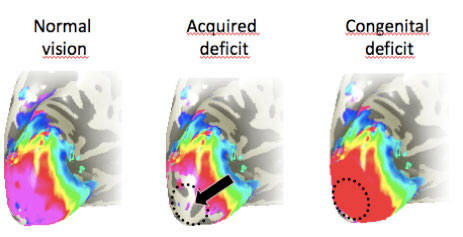Plasticity and stability of the visual system following sight loss
Lead researchers: Dr Heidi Baseler, Hull York Medical School, Department of Psychology and Professor Tony Morland, Department of Psychology
Heidi Baseler and Tony Morland focus on how the brain organises visual information following disease or damage to the visual system. They study the short and long-term effects of visual loss on the brain in patients with acquired and genetic causes of visual deficits, for example, macular degeneration, achromatopsia, albinism, and brain trauma. They are also interested in the effects of existing and novel treatments for visual loss and their ability to protect the visual pathways from degeneration. By understanding the neural changes following sight loss, Baseler and Morland hope to contribute to advances in diagnosis and treatment for common causes of blindness. Their recent work has been funded by the Medical Research Council, Biotechnology and Biological Sciences Research Council, the European Commission and Fight for Sight.

Figure 1: The mapping of the retina on the surface of the brain. Acquired loss of central vision in adulthood leads to a ‘hole’ in the map consistent with the damage to the retina. However, if visual loss occurs before birth, as found in some congenital deficits, there appears to be a ‘filling in’ of the map. Taken together these results indicate that plasticity during development can reshape the visual maps in the human brain, but such plasticity is far more limited in adulthood.
